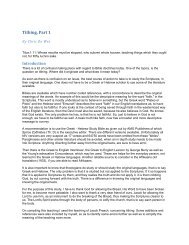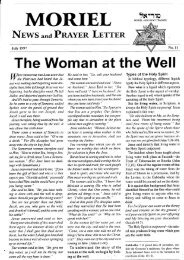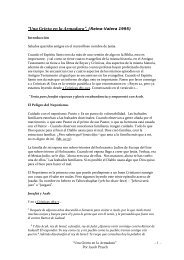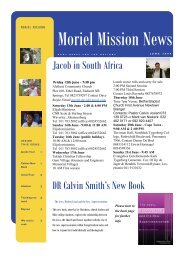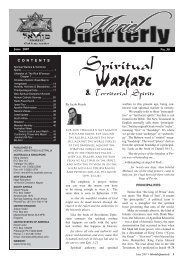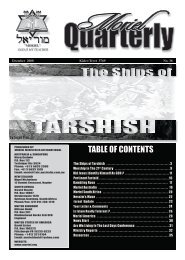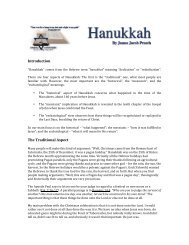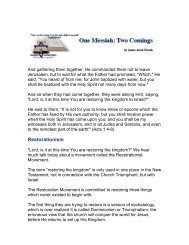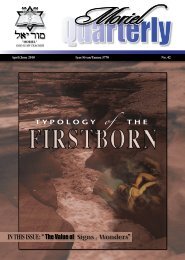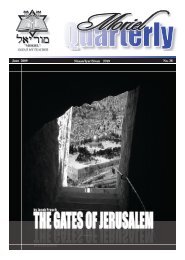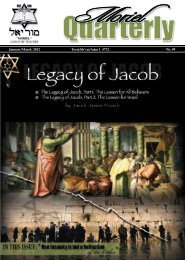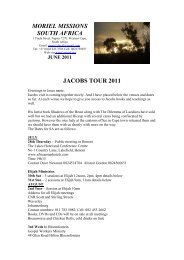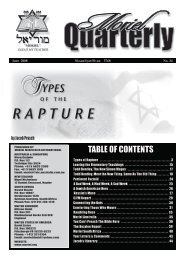The Scarlet Cord - Moriel Ministries
The Scarlet Cord - Moriel Ministries
The Scarlet Cord - Moriel Ministries
- No tags were found...
Create successful ePaper yourself
Turn your PDF publications into a flip-book with our unique Google optimized e-Paper software.
Hebrew Teaching<br />
Jacob Prasch<br />
“Midrash and the book<br />
of revelation”<br />
a. midrash study<br />
1. history of the church<br />
a. christ’s teachings<br />
b. apostolic teachings - paul<br />
2. history of false teachings<br />
a. gnostic<br />
3. history of hellenistic teaching<br />
4. midrash<br />
a. jewish culture<br />
b. how rabbi’s taught - paul<br />
I<br />
R<br />
Introduction<br />
ecently, a blogging match concerning<br />
my comments on the New Testament<br />
use of midrash sprung up<br />
between believers who seriously study the<br />
Word of God, and religious babblers who<br />
mislead those who imagine themselves to<br />
be the guardians of scriptural truth.<br />
A wide array of conservative Evangelical<br />
scholars has affirmed the use of midrashic<br />
hermeneutics throughout the history of the<br />
church. <strong>The</strong>se theologians include John<br />
Lightfoot, the 17th century English Puritan<br />
who published a midrashic commentary<br />
on the New Testament, to Bilderbeck and<br />
Strauss, to more contemporary figures such<br />
as T. Dockerty, E.E. Ellis, Richard Longnecker,<br />
Moises Silva and many others.<br />
Midrashic hermeneutics was used by the<br />
first-century Jewish Apostolic church from<br />
the Sitz im Leben of Second Temple period<br />
Judaism in the New Testament. Prophecyas-pattern,<br />
“pesher” interpretations, and<br />
apocryphal typology are ways a growing<br />
cadence of conservative Evangelical<br />
scholars account for the way in which the<br />
New Testament handles the Old Testament.<br />
This is seen in everything from the infancy<br />
narrative formula (eg., the Matthew 2:15<br />
pesher interpretation of Hosea 11:1, etc.),<br />
to Paul’s parody of Sarah and Hagar in Galatians<br />
chapter 4, to the literary genre of the<br />
epistle of Jude.<br />
It is obvious that Jesus and His apostles,<br />
being Jews, wrote not from a cultural vacuum<br />
but were divinely inspired to write<br />
from the context of their own language and<br />
culture. <strong>The</strong> Midoth of Rabbi Hillel that St.<br />
Paul would have learned from his rabbinic<br />
mentor Rabbi Gamaliel (Acts 22:3) are<br />
evident throughout his epistles and in the<br />
epistle to the Hebrews. In short, the New<br />
Testament handles the Old Testament in the<br />
same manner in which the Qumran Dead<br />
Sea scrolls and the inter-testamental apocryphal<br />
I & II Maccabees and I & II Enoch<br />
do. This responsively refutes the claims of<br />
liberal theologians (such as Oxford Professor<br />
James Barr) who argue by grammaticalhistorical<br />
exegesis that the New Testament<br />
is not to be taken literally because its apostolic<br />
authors did not handle Scripture in a<br />
literal fashion.<br />
In fact, it is not a misuse of midrash,<br />
but the misuse of the grammatical-historical<br />
exegesis that the Reformers borrowed<br />
from 16 th -century humanism that gave<br />
rise to higher criticism by theological liberals.<br />
A more recent attempt made by the<br />
Anglican ultra-liberal John Shelby Spong<br />
to argue that midrash negates literalism, is<br />
automatically discredited as bogus and devoid<br />
of substance by the fact that the literal<br />
‘peshet’ interpretation must be established<br />
before the further ‘pesher’ meaning can be<br />
determined. Spong’s very premise reveals a<br />
fundamental ignorance. Moreover, in light<br />
of the Qumran discoveries even traditional<br />
Evangelical attempts to explain the New<br />
Testament’s handling of the Old by conventional<br />
conservative Protestant exegesis (as in<br />
the views of otherwise credible voices such<br />
as Walter Kaiser whose overall ministry this<br />
author endorses) cannot carry significant<br />
weight in light of the Qumranic evidence.<br />
Essentially, believers who are serious in<br />
their approach to the Word of God focus on<br />
what Scripture actually states concerning<br />
midrash and not on later rabbis or subscribers<br />
to the doctrinal errors of replacement<br />
theology debunked in Romans by Paul. Either<br />
of these extremes is erroneous.<br />
<strong>The</strong>re are multiple passages in the origi-<br />
10 <strong>Moriel</strong> Quarterly • September 2012




